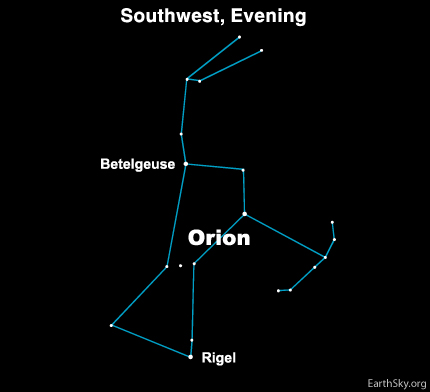Courtesy of EarthSky
A Clear Voice for Science
www.EarthSky.org
 We got this question: “Orion seems to have moved and turned considerably in the last two weeks. Will Orion disappear before summer?”
We got this question: “Orion seems to have moved and turned considerably in the last two weeks. Will Orion disappear before summer?”
The answer is that all the stars and constellations shift westward as the seasons pass . . . and they also move westward in the course of a single night. Orion is no exception. Exactly when Orion will disappear from the evening sky – into the sunset – depends on your latitude. The farther south you are, the longer you can see Orion. For the central United States, Orion is lost in the sun’s glare by early to mid-May (depending on how carefully you look for it). For all of us in the U.S., Orion is gone by the time of the summer solstice in June.
If you want to notice the westward shift of the constellations due to the passage of the seasons, be sure to watch at the same time every night. If you want to watch their westward shift throughout the night, just pull up a lawn chair and watch.
Either way, you can definitely notice Orion moving steadily westward.
The westward shift of the sky throughout the night is due to Earth’s spin under the stars. However, the westward shift of the stars throughout the seasons is due to Earth’s motion in its orbit around the sun. Earth’s motion in orbit causes our night sky to point out an ever-shifting panorama of the galaxy.
Why does Orion go into the sun’s glare each year at this same time? Because each year, as we orbit continually around the sun, our motion in orbit brings the sun between us and Orion at this same time each year.
Written by Deborah Byrd
Other Links:
The York County Astronomical Society
I'm up very early,,,every morning,up until two weeks ago,I would see Orion in the southern sky towards Atlanta.I live 50 miles south of Chattanooga.Now,,,that being said,as of two nights ago,at exactly the same time,that being 5:00am,I have noticed a 90* shift eastward.I guess my question is,,,is this an indication of the autumn solstice or something else.I,,not being that schooled in astronomy,have been showing an interest in the movement of the stars lately,,,since I'm always up at the same time every morning and the night skys have been clearing because of the absence of the haze and humidity.It's given me a chance to see things not normally seen.I have observed Jupiter and it's moons and a few other planets and stars.Anyway,,,any help or advice you can give me on this subject would be greatly appreciated.Like I said,,,I'm kinda new to this and being 60 years old and retired,,,it's giving me something to do.Thanks again and I look forward to any correspondance you might be able to send.